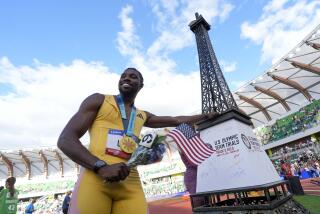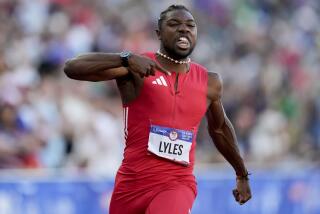Sprinter Was Greatest on a Great U.S. Team
- Share via
On the greatest day U.S. athletes had experienced at an Olympics, Eddie Tolan ascended to the title of “world’s fastest human.”
Tolan, a one-time University of Michigan sprinter, won the 200-meter final at the Coliseum and smashed a 28-year-old Olympic record by nearly half a second when he clocked 21.2 seconds. Two days earlier, he’d won the 100 by a hair’s breadth over U.S. rival Ralph Metcalfe.
In the 200, Metcalfe, of Marquette, was again the heavy favorite and he and U.S. teammate George Simpson were closing on Tolan in the stretch, but Tolan won by about a meter.
Tolan was the last of five U.S. winners on a day during which Americans achieved their best single Olympic day.
George Saling and Percy Beard ran 1-2 in the high hurdles, Americans John Anderson and Henri Jean Laborde were 1-2 in the discus, Babe Didrikson tied the world record of 11.8 in her heat of the 80-meter hurdles, and Stanford’s Bill Miller won the pole vault gold medal at 14 feet 1 3/4 inches.
Tolan’s hold on the “world’s fastest human” title was brief. Another Big Ten sprinter, Jesse Owens, soon took over.
The 5-foot-7 Tolan turned pro, winning races in Australia on a tour. He became a physical education instructor, working the Detroit school system for most of his life.
In the 1960s, he began experiencing kidney problems. He was 57 when he died in 1967 of a heart attack.
Also on this date: In 1936, Jesse Owens won the first of his four gold medals at the Berlin Olympics, winning the 100 meters in 10.3. . . . In 1921, baseball Commissioner Kenesaw Mountain Landis said the eight “Black Sox” players, accused of fixing the 1919 World Series, would remain suspended for life, despite their having been acquitted in a Chicago trial.
More to Read
Go beyond the scoreboard
Get the latest on L.A.'s teams in the daily Sports Report newsletter.
You may occasionally receive promotional content from the Los Angeles Times.






